|
FIRST
AD HOC OPEN-ENDED WORKING GROUP ON ACCESS AND BENEFIT-SHARING 22-26 October 2001 Bonn, Germany |
|||
|
||||
|
|
||||
| OPENING PLENARY: OPENING STATEMENTS | ||
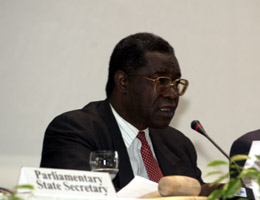 |
||
 Bärbel
Dieckmann (right), Mayor of Bonn, welcomed participants and highlighted
the city as a prime location for worldwide dialogue on environmental
issues. She noted that developing countries contain a large proportion of
biodiversity and that developed countries have a duty to accept
responsibilities towards them. Bärbel
Dieckmann (right), Mayor of Bonn, welcomed participants and highlighted
the city as a prime location for worldwide dialogue on environmental
issues. She noted that developing countries contain a large proportion of
biodiversity and that developed countries have a duty to accept
responsibilities towards them. |
||
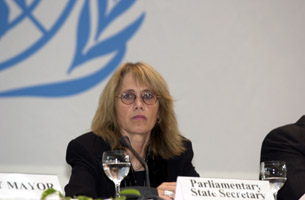 Gila
Altmann (left), Parliamentary State Secretary of the German Federal
Ministry for the Environment, Nature Conservation and Nuclear Safety,
discussed the importance of biodiversity conservation as a focal point in
German environmental policy, and highlighted some of the problems of
environmental degradation in Germany. Gila
Altmann (left), Parliamentary State Secretary of the German Federal
Ministry for the Environment, Nature Conservation and Nuclear Safety,
discussed the importance of biodiversity conservation as a focal point in
German environmental policy, and highlighted some of the problems of
environmental degradation in Germany. |
||
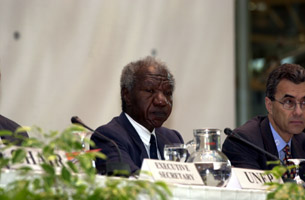 Paul
Chabeda (left), on behalf of Klaus Töpfer, Executive Director of the UN
Environment Programme, highlighted the importance of ABS in realizing the
CBD's objectives, as the issue underscores the principle of equity. He
also reviewed Decision V/26 establishing the Working Group and its mandate
to develop guidelines and other approaches to ABS. Paul
Chabeda (left), on behalf of Klaus Töpfer, Executive Director of the UN
Environment Programme, highlighted the importance of ABS in realizing the
CBD's objectives, as the issue underscores the principle of equity. He
also reviewed Decision V/26 establishing the Working Group and its mandate
to develop guidelines and other approaches to ABS. |
||
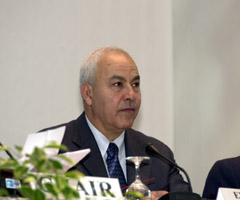 CBD
Executive Secretary Hamdallah Zedan (left) thanked the Government of
Germany for its financial and technical support, as well as the
Governments of Sweden and the UK. Noting work done by the Experts'
Panel, he said this meeting marks a new and crucial stage in the CBD
process and that successful guidelines on ABS will be used to judge the
Convention's effectiveness. CBD
Executive Secretary Hamdallah Zedan (left) thanked the Government of
Germany for its financial and technical support, as well as the
Governments of Sweden and the UK. Noting work done by the Experts'
Panel, he said this meeting marks a new and crucial stage in the CBD
process and that successful guidelines on ABS will be used to judge the
Convention's effectiveness. |
||
| ORGANIZATIONAL MATTERS: | ||
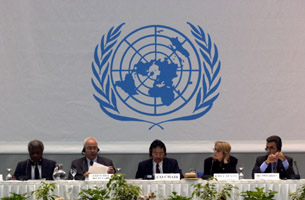 Olembo
introduced the agenda (UNEP/CBD/WG-ABS/1/1/Add.1/Rev.1), which was adopted
without comment. Delegates elected, as per the COP-5 Bureau's
suggestion, Gila Altmann (Germany) and Mohamad bin Osman (Malaysia) as the
meeting's Co-Chairs. They also approved the meeting's organization of
work: SWG-I, chaired by Birthe Ivars (Norway), would address the
development of draft international ABS guidelines; and SWG-II, chaired by
José Cabrera Medaglia (Costa Rica), would address other approaches,
including an action plan for capacity building, and intellectual property
rights (IPR) in ABS arrangements. Olembo
introduced the agenda (UNEP/CBD/WG-ABS/1/1/Add.1/Rev.1), which was adopted
without comment. Delegates elected, as per the COP-5 Bureau's
suggestion, Gila Altmann (Germany) and Mohamad bin Osman (Malaysia) as the
meeting's Co-Chairs. They also approved the meeting's organization of
work: SWG-I, chaired by Birthe Ivars (Norway), would address the
development of draft international ABS guidelines; and SWG-II, chaired by
José Cabrera Medaglia (Costa Rica), would address other approaches,
including an action plan for capacity building, and intellectual property
rights (IPR) in ABS arrangements.
|
||
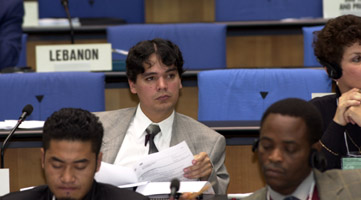 SWG-I
Chair Medaglia (left) reported on the outcomes of Panel of Experts
meetings in Costa Rica (UNEP/CBD/COP/5/8) and Montreal (UNEP/CBD/ABS-WG/1/2). SWG-I
Chair Medaglia (left) reported on the outcomes of Panel of Experts
meetings in Costa Rica (UNEP/CBD/COP/5/8) and Montreal (UNEP/CBD/ABS-WG/1/2). |
||
 WIPO
reviewed the work of its Intergovernmental Committee on Intellectual
Property and Genetic Resources, Traditional Knowledge and Folklore with
regard to: guiding contractual practices and model IPR clauses for ABS
arrangements; traditional knowledge; and cooperation with the CBD and the
Commission on Genetic Resources for Food and Agriculture. WIPO
reviewed the work of its Intergovernmental Committee on Intellectual
Property and Genetic Resources, Traditional Knowledge and Folklore with
regard to: guiding contractual practices and model IPR clauses for ABS
arrangements; traditional knowledge; and cooperation with the CBD and the
Commission on Genetic Resources for Food and Agriculture. |
||
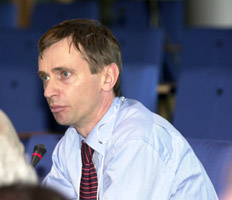 The
UN FOOD AND AGRICULTURAL ORGANIZATION (FAO) provided an update on the
negotiations for the revision of the International Undertaking (IU), as in
Annex II of UNEP/CBD/WG-ABS/1/3, and said that an Open-ended Working Group
would convene from 30 October to 1 November to address pending items and
finalize the text for the agreement to be adopted during the upcoming FAO
Conference. The
UN FOOD AND AGRICULTURAL ORGANIZATION (FAO) provided an update on the
negotiations for the revision of the International Undertaking (IU), as in
Annex II of UNEP/CBD/WG-ABS/1/3, and said that an Open-ended Working Group
would convene from 30 October to 1 November to address pending items and
finalize the text for the agreement to be adopted during the upcoming FAO
Conference. |
||
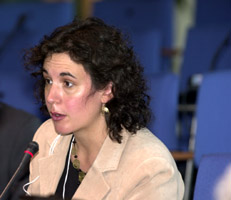 The
UN CONFERENCE ON TRADE AND DEVELOPMENT reported on recent meetings on the
role of traditional knowledge in trade and development, with specific
regard to strategies for cooperation with WIPO and other relevant bodies,
the BIOTRADE Initiative, development of country-specific capacity-building
projects, and the harnessing of traditional knowledge for trade and
development. The
UN CONFERENCE ON TRADE AND DEVELOPMENT reported on recent meetings on the
role of traditional knowledge in trade and development, with specific
regard to strategies for cooperation with WIPO and other relevant bodies,
the BIOTRADE Initiative, development of country-specific capacity-building
projects, and the harnessing of traditional knowledge for trade and
development. |
||
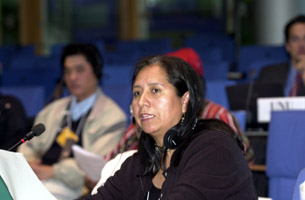 The INTERNATIONAL INDIGENOUS FORUM ON BIODIVERSITY presented the statement of its meeting held from 15-21 October 2001. Noting that the CBD was negotiated without the participation of indigenous peoples, the Forum emphasized, inter alia, the links between indigenous peoples and biodiversity with reference to the role of women in preserving this biodiversity, and the collective rights of indegenous peoples. |
||
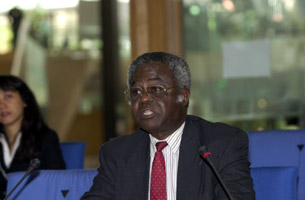 A
representative of the National Session of the GLOBAL BIODIVERSITY FORUM
for Germany highlighted its recent deliberations, noting the need to, inter
alia: broaden ABS debates beyond commercial aspects to include
conservation, sustainable use, the ecosystem approach and poverty
alleviation; adopt measures regarding user responsibilities; ensure that
IPR support the CBD's objectives; and support development,
implementation and monitoring of national ABS policies. A
representative of the National Session of the GLOBAL BIODIVERSITY FORUM
for Germany highlighted its recent deliberations, noting the need to, inter
alia: broaden ABS debates beyond commercial aspects to include
conservation, sustainable use, the ecosystem approach and poverty
alleviation; adopt measures regarding user responsibilities; ensure that
IPR support the CBD's objectives; and support development,
implementation and monitoring of national ABS policies. |
||
 BELGIUM,
on behalf of the EU, stressed the need for mutual support among the ABS
guidelines and relevant initiatives in other fora. IRAN, on behalf of the
G-77/CHINA, highlighted benefit-sharing's significance for developing
countries. TOGO (right), on behalf of the AFRICAN GROUP, said that
benefit-sharing is one of the preconditions for biodiversity conservation
and that access is closely related to traditional knowledge. Right photo:
Kofi Dantsey Edinam giving his opening statement on behalf of the AFRICAN
GROUP. BELGIUM,
on behalf of the EU, stressed the need for mutual support among the ABS
guidelines and relevant initiatives in other fora. IRAN, on behalf of the
G-77/CHINA, highlighted benefit-sharing's significance for developing
countries. TOGO (right), on behalf of the AFRICAN GROUP, said that
benefit-sharing is one of the preconditions for biodiversity conservation
and that access is closely related to traditional knowledge. Right photo:
Kofi Dantsey Edinam giving his opening statement on behalf of the AFRICAN
GROUP. |
||
| SUB-WORKING GROUP I: | ||
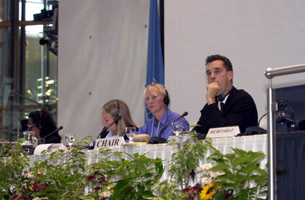 The
Secretariat introduced document UNEP/CBD/WG-ABS/1/3. SWG-I Chair Ivars
called for comments on the guidelines' key features, as included in
Section II of the document. The G-77/CHINA, noted that, pending regional
consultations, comments would be preliminary. Right photo: The WG I dias
chaired by Birthe Ivars (second from right) of Norway. The
Secretariat introduced document UNEP/CBD/WG-ABS/1/3. SWG-I Chair Ivars
called for comments on the guidelines' key features, as included in
Section II of the document. The G-77/CHINA, noted that, pending regional
consultations, comments would be preliminary. Right photo: The WG I dias
chaired by Birthe Ivars (second from right) of Norway.
|
||
| SUB-WORKING GROUP II: | ||
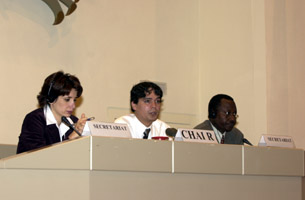 SWG-II
Chair Medaglia (center) introduced the agenda item on an action plan for
capacity building. The Secretariat reviewed documents UNEP/CBD/WG-ABS/1/2
and 3. Chair Medaglia noted that SWG-II could either complete a detailed
plan of action or indicate the main elements of such a plan. SWG-II
Chair Medaglia (center) introduced the agenda item on an action plan for
capacity building. The Secretariat reviewed documents UNEP/CBD/WG-ABS/1/2
and 3. Chair Medaglia noted that SWG-II could either complete a detailed
plan of action or indicate the main elements of such a plan.
|
||
| ENB ABS-WG1 SNAPSHOTS: | ||

|
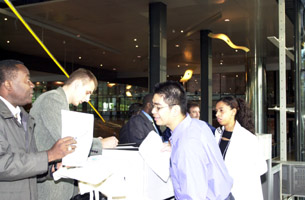
|
|
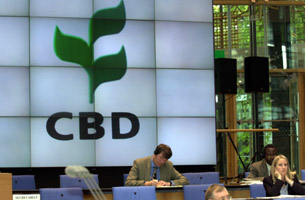
|
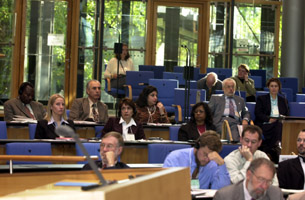
|
|
|
|
||
| © 2001, IISD. All rights reserved. |
|
|
|
|
|
|
||
| © 2001, IISD. All rights reserved. |
|
|





